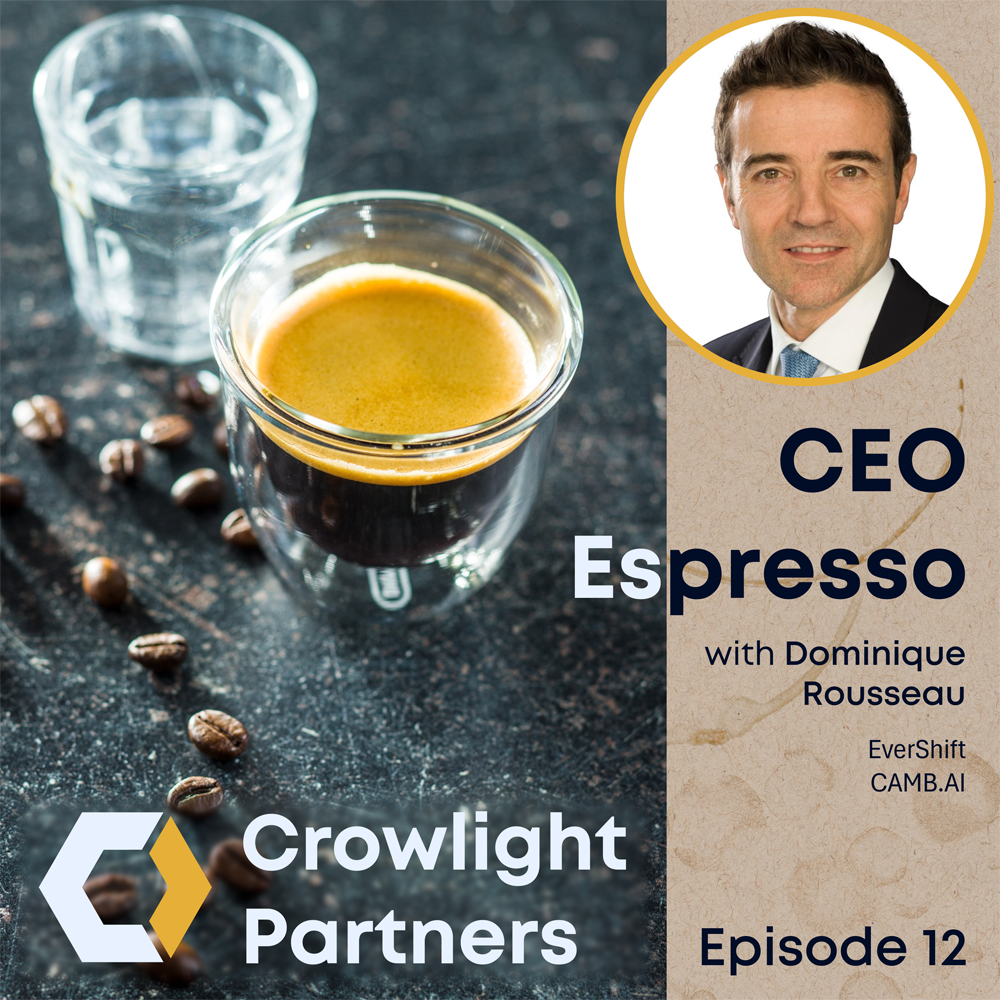Meet Dominique Rousseau — a seasoned executive with more than 30 years of experience in telecoms and technology, now turning his corporate legacy into entrepreneurial impact.
Dominique has lived in Luxembourg for nearly two decades — long enough to become Luxembourger alongside his French nationality. He originally moved there to build what became one of Vodafone’s biggest global success stories: the centralised procurement organisation serving all Vodafone markets. That first transformation was later followed by another, when he took over Vodafone’s roaming business as CEO and centralised global roaming services for hundreds of millions of customers. In the following years, Dominique led Vodafone’s global device business, overseeing the sourcing and commercial strategy for all consumer hardware across 21 markets.
In 2024, Dominique decided to begin a new chapter in a more entrepreneurial direction. Today, he splits his time between two activities: advising a major European tech company on its consumer strategy, and driving the embedded voice-AI business at CAMB.AI — a space he sees as the next major interface revolution.
Our conversation explores these transitions: what drives him, how he thinks about innovation, negotiation, leadership, and how he maintains clarity and energy in the middle of such a profound career shift.
Question: When you think about your job, what is the part you’re most proud to talk about?
Response: With no hesitation: creating impact for customers. Bringing technology into their hands in a way that genuinely helps them — that’s what I’m passionate about.
And there is a second element that I am always carrying with me: doing it sustainably. Minimising CO₂ footprint as much as possible, and giving customers the tools to do the same. I really believe this is one of the major challenges for the planet.
In my previous device role, those were the two big priorities. And in my new job, it’s essentially the same — just in a different context. Those two focus areas remain my compass.
Is there any decision you would have made differently in hindsight?
Honestly, no. I’ve always been driven by passion, and every step I took came from a mix of opportunity and genuine enthusiasm for what I was doing. I feel I made the right choices; I wouldn’t change them.
Maybe one anecdote illustrates this. My initial dream was to become a firefighter in Paris. Paris firefighters are part of a commando unit — it’s a military corps, one of the only two military firefighter organisations in France, together with Marseille. It’s extremely difficult to get in, but from a very young age I wanted to do it: the action, the sense of supporting people — all of that resonated deeply with me.
And I did it. I became a firefighter in Paris. After some time, I realised the military environment wasn’t the right long-term fit for me, so I left and went back to study — six years of education after that. But it shows how passion drove my decisions. So no, I’m really happy with the path I took.
Reminds me of the slogan, “Just Do It” …
That’s definitely one of my mottos. Whenever you make a decision, there are always pros and cons. When you choose something, you automatically say “no” to something else, and you need to be aware of that. But if you feel the energy for something — the vibes — that’s very important. You should follow it.
When you think about your current focus, what are the challenges you face in maintaining a competitive edge?
What I really enjoy is that I moved from a big corporation — over 30 years in corporate — into something much smaller. Take CAMB.AI, for example: it’s a 50-person company. Nothing to do with a large corporate environment. What I appreciate is the impact you can create. You’re really working on core innovation.
We’re focused on voice AI, and I’ve been a strong believer in voice interfaces for a long time — not just recently. Just like touchscreen was a revolution when Steve Jobs introduced it — and nobody believed in it at first — I think voice will be the next technological interface. Touchscreens are great, but they have limitations you feel every day. What’s missing is the ability to speak to the machine and have it respond in your own language, without settings or complexity. It should recognise your voice, translate what you say, interpret incoming messages in any language — and deliver it back to you in yours.
That, to me, is the future. And that’s why I’m so happy to work on this.
Thinking about that future, what is the biggest challenge: Is it partnering, technology, user acceptance…?
It’s multi-dimensional.
First, you need the right partners and distributors. For us, that means OEMs and chipset partners, because we want to run the voice AI model on the edge — directly on the device. Imagine a TV that translates anything you hear into your language, or adds instant closed captions. For that, you need partners who truly believe in the idea.
Second, packaging it for the customer. We do this with passion, but we also want to make money. So how do you price it? How do you shape the market? How do you present it so it’s attractive enough that customers are willing to pay for something genuinely exciting? That’s a major challenge, and one we’re working on right now.
Third, funding. We want to scale, and we want to keep improving the model. We believe ours is unique and the most advanced in the industry right now, but continuous improvement is essential — especially when miniaturising the model to run natively on the device. So investment is key.
Those are the three main challenges.
Are you in a race with other competitors who are close?
Of course. New technology is always a race. You want to be first. And so far, from what we see, we’re winning. I can’t disclose details yet, but we are securing big markets with major industry players. That wouldn’t happen if the performance wasn’t strong.
The addressable market seems enormous — from anyone who uses virtual conferencing software to smart glasses who translate speech in real time.
Exactly. You can have our technology on Meta glasses, on TWS [true wireless stereo] earbuds, on simple in-ear devices. That’s the objective.
But we’re the model provider — the algorithm. We need partners who have the product portfolios and the distribution channels. We already have a strong pipeline of motivated candidates, but it’s still early days. It’s a race, and there are other companies out there. But when it comes to the edge — meaning true on-device capability — we are, I believe, the furthest along.
How does this translate into negotiations with partners or with investors? How do you prepare?
We’re heading into another fundraising round in Q1 next year, which will naturally involve negotiation — but also convincing investors that this is a sustainable, growing business. Which it is, by the way. But it still requires work.
On the partner side, we’re already selling our model today — mainly for broadcasting use cases. For example, real-time translation of speakers during live events. But the next step is selling it as a native on-device capability.
Through a licensing model, for example?
Exactly — a licensing model. And that means negotiation. You need to be open enough to create a true win-win scenario, where everyone sees value, including the end customer. Ultimately, we always return to that point.
Do you also have internal negotiations around what’s the best way to commercialise and scale your technology?
Yes, many, many, many. We’re not a big company, so we talk about these things every day.
When it’s about devices, which is my core area, I mainly drive the discussions with partners. In the background, we’re constantly aligning with the CEO and the CTO to make sure that what I promise can actually be delivered. That’s very important.
We also learn from what has already been done in other contexts, not only on-device. The CEO brings a lot of experience here. So the internal negotiations are very constructive. And of course, when we speak externally, we have one voice. We’re clear on what we want, clear on the goals — and clear on when it’s time to leave the negotiation room. That clarity is essential in negotiation.
Shifting to a more personal perspective: what is the most important lesson you’ve learned this year?
Coming from big companies, one of the big lessons for me was this: when I left, I suddenly found myself alone with my chair and my desk. So the main lesson is learning to trust yourself — to trust that you made the right decision. If you move because you have a vision and you’re driven by passion, you shouldn’t step back too quickly. Believe in what you’re doing and keep going.
There are days when you have doubts. To give you an anecdote: creating my own company — even a small company in Luxembourg — meant going through all the administrative processes by myself: business licenses, bank accounts, KYC [Know Your Customer, a mandatory verification process], anti–money laundering, all of that. I had good contacts in Luxembourg who helped, but it was still painful.
Even things like VAT declarations — you never think about them before. So the key is to stay very focused on what really matters, and not give up too early. Be persistent.
And on those days of doubt — what do you personally do to get back on track? Do you reach out to others?
Yes. I do two things, and everyone has to find their own way.
First, I keep a strong sports routine. I train regularly — running, swimming — and I find it extremely helpful. When I’m really down, going for a run or a swim helps a lot. It gives structure and resets the mind.
Second, I connect with people who support me and want me to win. My wife is the first example: she’s very supportive of what I do, she knows me from my corporate life and now in this new environment. That’s a very strong support.
Then there are partners and former colleagues — for example, people from Vodafone, where I kept very good relationships. I call them for advice, for tips, to debrief how I feel. Often people just need one or two minutes to listen and then give you an insightful comment or idea. That helps enormously.
You’ve seen both worlds — large corporates and startups. What, for you, is the best indicator in your daily routine that reflects a healthy corporate culture?
An easy way to recognise a healthy culture is to see whether people are smiling and genuinely happy in their work.
I’ve seen companies with very different cultures, including ones where people were clearly not happy — cultures driven by stress or fear. I don’t think that’s sustainable, and I don’t think it brings out the best in people.
You want to get the most out of people by making sure they understand where you’re going, that they are behind you, and that they are happy to be behind you. That’s one of the key learnings from my corporate life.
And now, as we’re building a new business, it’s the same. We’re growing, I’ll be recruiting soon, and I want to keep exactly that spirit.
In large, listed companies, decision-making is often more conservative. How do you recognise when leaders are making bold decisions rather than just playing it safe?
Without naming any company, my experience is that with large, listed organisations carrying big brands, there is a constant focus on protecting the brand. So every decision is taken with great care, through a formal management decision process. It becomes quite risk-averse.
With smaller companies, it’s different. They want to move faster. They have less to lose and more to win, so the attitude to risk is not the same.
In every big corporation I’ve worked with, I’ve seen this complex, cautious decision process. It can be a burden, but it’s also understandable — you’re dealing with a lot of responsibility and reputation.
What are some skills or areas of expertise you’re currently developing further?
One key skill I’m developing — and I’m really learning it on the job — is product proposition. And when I say “product,” I mean it in a broad sense, not just hardware. It’s about designing a proposition and being able to explain it simply, in a way that creates real impact on the customer — so that the customer says, “Wow, yes, I want this.” Especially in the field I’m in now, that’s a big area of learning for me. It’s probably the main one at the moment.
Let me share an anecdote. Over 20 years in corporate, we went through many different management styles. At one point, we were trained specifically on storytelling: you must have a story to tell. That doesn’t mean going into every technical detail of how you do things. It means being able to tell the story properly. And that’s closely linked to the proposition.
I’ve seen colleagues who are absolutely top-level at this — very strong storytellers — and others who are more shy and don’t like to speak. But if you drive a business and want to create impact, you need to be able to tell the story. If you don’t tell it, the customer never really knows.
Storytelling is also about emotions. Talking about something analytically might create understanding, but it’s feelings that makes people act — to try, to buy, to adopt.
On that note — if you have interested customers, what’s an entry-level way to engage with CAMB.AI?
So first, you’re right: The passion, the emotion you convey, that’s what makes the customer say, “Yes, this is something I’d really like to try.”
And before they fully commit, we have demos and we have videos that explain the capabilities. Then the productisation is always a bit customer-specific. We work together with customers to shape the final proposition for their use case. And I think that co-creation — adapting the solution together — is where the magic happens.
We conducted the interview in November 2025.





